Welcome to a ‘wild’ month for our gourmet tea club subscribers! This month we have some very unusual teas revolving around the same theme: they are all from wild tea plants. We have an unusual and delicate Korean semi-wild green tea – Dong Cheon Daejak; a green tea from Vietnam plucked from wild trees growing high on mountain slopes – Purple Rain; Wild Boar – another Vietnamese black tea, named after the boars that roam the forests where it’s picked; and finally a rare and unusual wild black tea from a strain of camellia native only to Taiwan – Yuchi Wild Shan Cha. We hope you enjoy the selection, and to accompany the tasting, here is some in-depth information on all teas featured in our November Curious Tea boxes.
-
November’s wild teas:
- Light: Dong Cheon Daejak Semi-Wild Green Tea and Purple Rain Wild Green Tea;
- Dark: Wild Boar Black Tea and Yuchi Wild Shan Cha;
- Mixed: Dong Cheon Daejak Semi-Wild Green Tea and Wild Boar Black Tea.
Dong Cheon Daejak Semi-Wild Green Tea
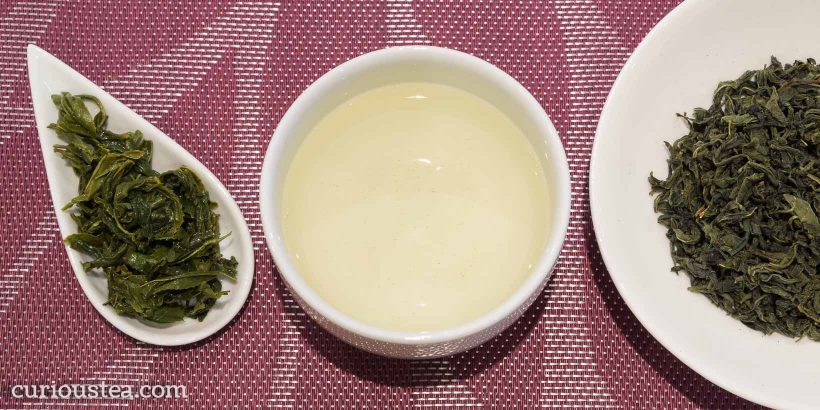
This is a lovely Daejak grade green tea from the Dong Cheon co-operative of farmers. In South Korea a Daejak grade is normally plucked in summer and is the third flush of the season. It is also normally the flush when the largest leaves are plucked from the trees. While earlier flushes are more prized, they also attract very high prices due to small scale of tea production in the country. In fact, South Korea produces a fifth of the production of Taiwan and more than 25 times less than Japan (Japanese production of tea for 2013 was 84,800 tonnes, production of South Korea amounted to 3,200 tonnes).
Tea (as in a drink made from the leaves of Camellia sinensis) is not a hugely popular drink at present in South Korea and this is reflected in the small amount produced in the country. Koreans generally enjoy drinking coffee and other herbal or fruit infusions, but proper tea is becoming increasingly popular among the trendy crowds of Seoul. It is also worth pointing out that the country has a very long running tea tradition and there are plenty of people who are very keen to revive the tradition of Korean tea and to popularise it. This has led to production of the plant to steadily increase in the past 10 years to the level it is now.
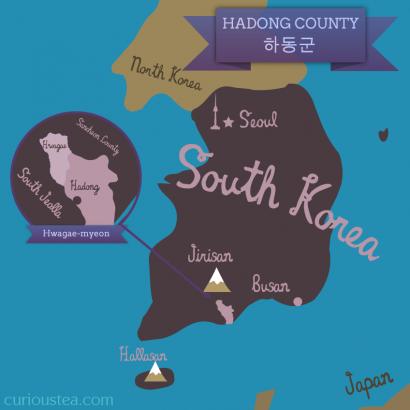
This tea comes from the Dong Cheon co-operative of farmers and their goal is to maintain Korea’s rich history of tea and to introduce more and more people to it. Although Korean teas may look similar to some Chinese and Japanese counterparts, their taste can be quite unusual due to quite different production methods. This particular tea is produced using the Jeong-cha production method where the freshly hand plucked leaves are plunged into near boiling water. After this hot bath they are shaped and dried in a hot iron cauldron until finished. The result carries a stronger, bolder and deeper flavour that is quite distinctive.
This is a semi-wild tea, which means that the trees are from an ancient cultivar from Hadong Province that used to grow wild; they are grown without pesticides or herbicides and are normally planted but then basically left to grow on their own. The dry leaves are dark green, long and wiry and have a faint grassy and toasty aroma. The liquor is refreshing and has an aroma of toasted corn with a subtle grassy and sweet taste with notes of vanilla and cream. It is a very smooth and interesting tea that would pair well with pastries and other sweets.
It is best brewed at 70°C for 1 minute or less according to your taste. This tea should definitely be brewed multiple times to enjoy the different flavours from each brew.
You can buy Dong Cheon Daejak Semi-Wild Green Tea from our online shop.
Purple Rain Wild Green Tea
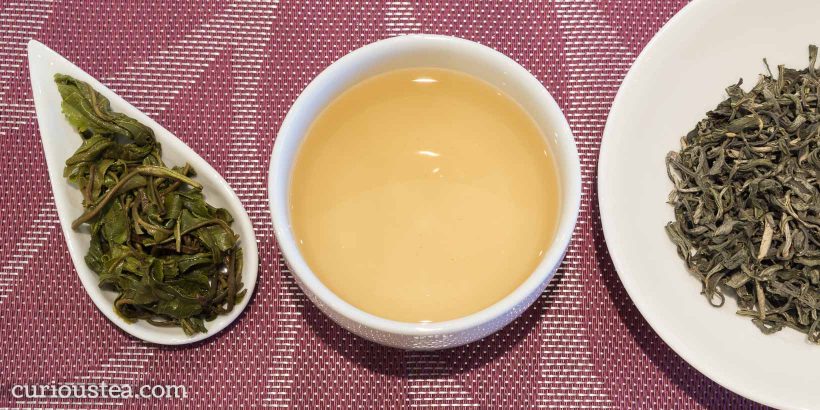
This is one of the first Vietnamese teas to feature in a Curious Tea box. This particular one comes from Muong Khuong, Lao Cai Province in the Northeast of Vietnam. It is a very true wild tea, which is plucked and processed entirely by the Hmong ethnic families. The Hmong ethnic group started immigrating to this area of Vietnam from the 18th century and came from Southern parts of modern day China, including from Yunnan. As they travelled south they brought with them tea processing techniques and knowledge from China. Traditional teas produced by ethnic groups in Vietnam tend to have some similarities to popular Chinese teas due to similar processing methods employed.
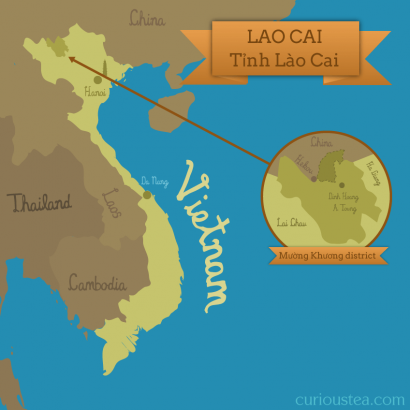
This tea is plucked by hand from wild tea trees that grow in the forests around Muong Khuong at an altitude of around 1,600 metres. It is a long trek to find the trees in the forests but the local hill people make the trek every day during the picking season to these magnificent ancient tea trees (Camellia sinensis var. assamica). The trees themselves are indigenous to these forests and grown completely wild and under organic conditions. As they are left untended, they grow up to 3 metres tall with trunks a few metres in diameter. Some trees are very ancient, with many being centuries old and some purportedly dating back 800 years.
The name for this tea comes from the colour of the young leaves. When plucked many have a purple hue to them which is the result of this specific terroir. This tea is produced almost entirely by hand using very limited technology. The freshly plucked leaves are baked in an oven fired by longan wood, rolled and dried several times until considered finished. This process is carried out by Mr Chiu, in a very small quantity, and relies entirely on his knowledge and expertise.
You’ll find this Purple Rain tea only in the November Light subscription boxes. The flavour profile of this tea is somewhat similar to a young sheng (raw) pu-erh tea. The dry leaves are twisted, wiry and green in colour. The liquor produced is light yellow in colour with a slightly smokey aroma of vegetables and sweet spices. It has a very complex savoury taste reminiscent of earthy green vegetables, kombu seaweed and exotic mushrooms with a hint of smoke. A very unusual cup with an extremely delightful complexity.
This tea is best brewed at 80°C for 1 minute and should be brewed multiple times. When experimenting with repeated steepings, you can gradually increase the water temperate and steep time to extract fuller flavour.
You can buy Purple Rain Wild Green Tea from our online shop.
Wild Boar Black Tea
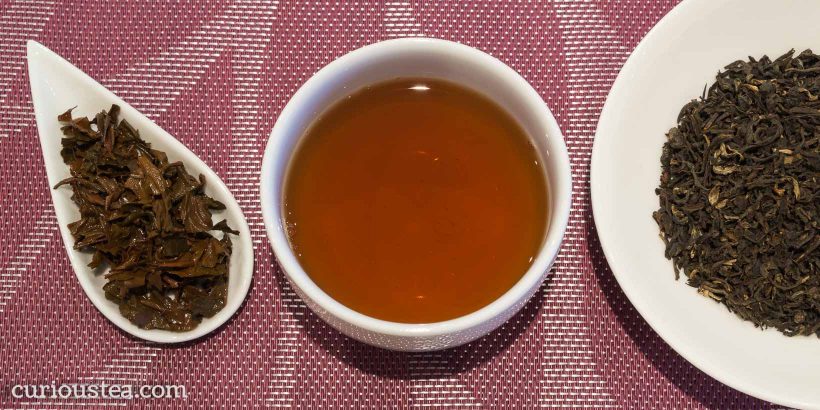
Another Vietnamese wild tea, this one comes in the guise of a black tea and is plucked by local hill tribes around Van Chan, Yen Bai Province. It is harvested from wild trees that grow at an altitude of 1,300 metres and above. These trees grow on the high forested mountain slopes completely naturally and without any human interference.
The somewhat unusual name comes from the wild boars that roam the remote forests where this tea is plucked. Orthodox production methods produce a tippy whole leaf from these ancient tea trees (Camellia sinensis var. assamica). The harvested leaves are processed by a family run factory using very traditional methods of production, which involve withering, oxidation, drying and sorting.
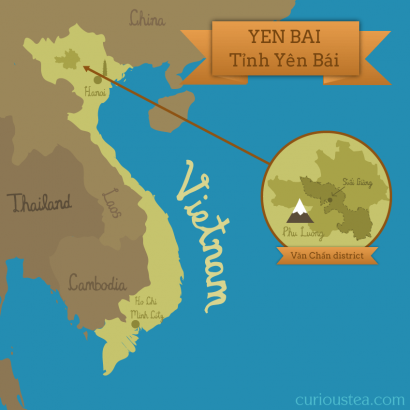
This tea is quite similar to a high grade Assam, although it does have an extra dimension due to the terroir, as well as the traditional whole leaf processing methods employed.
The dry leaves are very dark in colour and are medium sized. The liquor is a brilliant dark copper colour and has an intriguing aroma of peppery green vegetables. It has an extremely smooth taste that is a little sweet; we find it rich, malty and a somewhat peppery. Wild Boar Black Tea is very reminiscent of a good strong Assam but is not as high in tannins and has a very clean finish. A very satisfying and thirst quenching cup overall that would easily please any fan of Assam and pleasantly surprise others.
These leaves are best brewed with water at 95°C for around 2 minutes. Definitely experiment with re-brewing the tea leaves. It’s also best taken without milk or sugar but can be brewed stronger, in which case, it can take a little bit of milk or lemon to taste.
You can buy Wild Boar Black Tea from our online shop.
Yuchi Wild Shan Cha
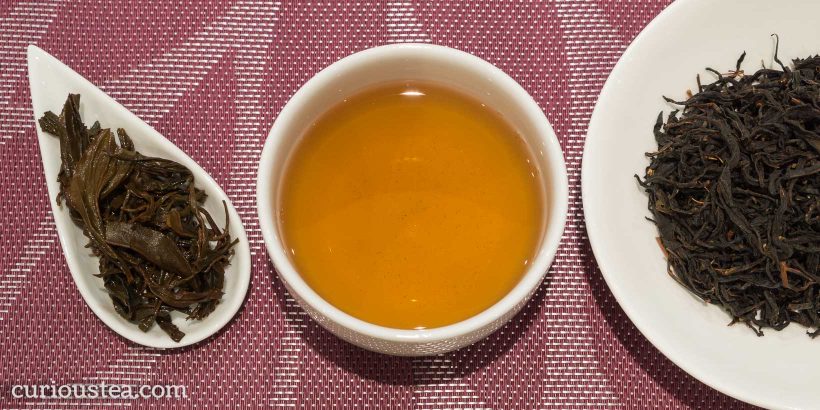
Yuchi Wild Shan Cha comes from a strain of camellia that is native only to Taiwan. There are also some that consider it to be an independent species based on DNA analysis and have attributed this tea the scientific name of Camellia formosensis. Either way this wild Taiwanese tea has been known for a long period of time and has been called ‘tea of the gods’ by the indigenous people of Taiwan.
This is a highly unusual and rare tea that grows wild around Yuchi Township in the Sun Moon Lake National Scenic Area. Shan Cha literally translates as ‘mountain tea’ and is the name given to this type of wild tea found only in Taiwan.
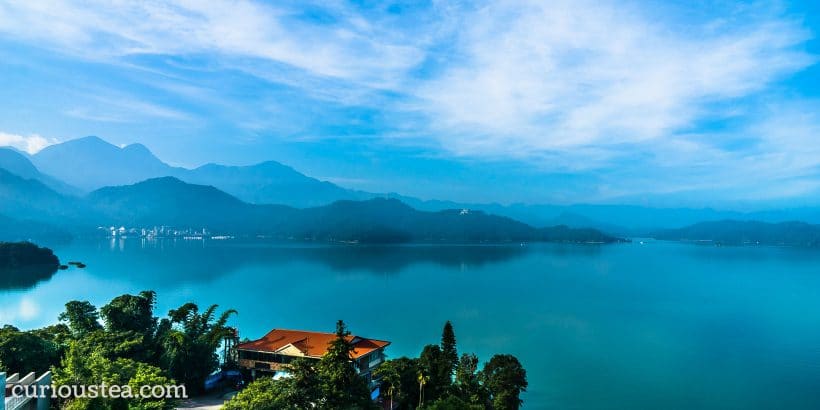
Presently, the Sun Moon Lake area is particularly known for production of black tea varieties. It has been selected by the Tea Research and Extension Station, a body responsible for developing the tea industry of Taiwan, as the best place to develop a black tea industry. The native wild tea plants found in this area have gained popularity during this process as more attention is now drawn to black style teas from here. Further interest was generated when the Taiwanese wild tea plants were used to create a very popular black tea hybrid (TRES No. 18 ‘Red Jade’). However the limited supply of wild tea plants found around the area means that the supply of this particular tea is restricted and it is very rare indeed.
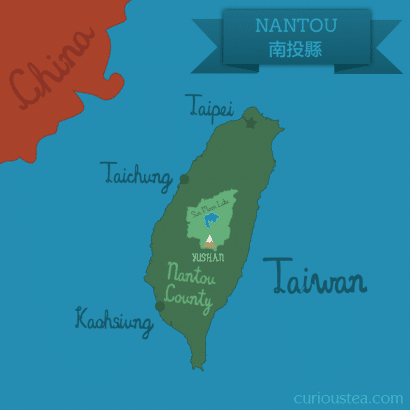
We were extremely excited at the opportunity to feature such a rare and unique tea, so we selected this Yuchi Wild Shan Cha for our November Dark tea subscription boxes. We find it extremely easy to drink – a very charming offering, it is subtle yet powerful with a good body and lovely aroma. It also has a very distinctive taste that is reminiscent of other Taiwanese black teas. The dark leaves are very long and wiry and unfurl into full leaves when brewed. The liquor is dark amber with a pleasing fragrance of baked sweet oats. It tastes a little savoury but sweet at the same time, surprisingly similar to a roasted tomato soup. There are notes of honey, cooked fruits and peaches with a very clean finish. A very subtle cup of black tea with a unique flavour that will keep you coming back for more!
Yuchi Wild Shan Cha is best brewed at 90°C for around 2 minutes and can be brewed multiple times. Best taken without milk or sugar.
You can buy Yuchi Wild Shan Cha from our online shop.
We really hope that you enjoy our wild tea club selection for November and are looking forward to what we have in store for your December selection.
Incidentally, if you are reading this but do not subscribe to our monthly tea club and would like to receive our future selections, you can sign up to our tea club instantly. We ship worldwide from the UK.
As always, we want to hear from you, so please leave a comment for us. Also if you have any questions, suggestions or just want to talk about tea, contact us at contact@curioustea.com, via our Facebook page or via Twitter.
Please also follow us on Instagram for lots of pretty tea photos.
Happy tea tasting!

